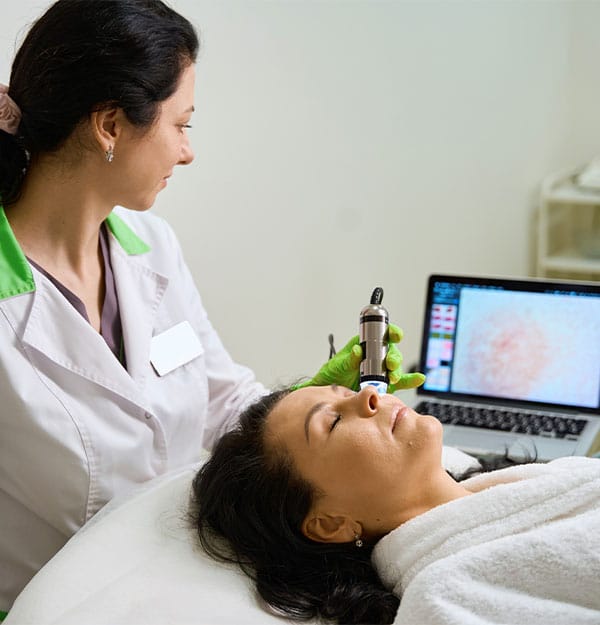Clinical Research at CRN
Understanding Dermatology
Dermatology is the branch of medicine that focuses on the diagnosis, treatment, and prevention of skin, hair, and nail disorders. The skin, being the largest organ of the body, plays a vital role in protecting against environmental hazards and maintaining overall health. Dermatological conditions can vary widely in severity and impact, ranging from common issues like acne and eczema to more serious conditions such as psoriasis, skin cancer, and autoimmune disorders affecting the skin.

Common Dermatological Conditions:
Acne: A chronic skin condition that occurs when hair follicles are clogged with oil and dead skin cells, leading to pimples, blackheads, and cysts.
Eczema (Atopic Dermatitis): A condition that makes the skin red, inflamed, and itchy. It’s common in children but can occur at any age.
Psoriasis: A chronic autoimmune condition that causes the rapid buildup of skin cells, leading to scaling and inflammation.
Rosacea: A chronic skin disease that causes redness and visible blood vessels in the face, often with red bumps that resemble acne.
Skin Cancer: Includes various forms such as melanoma, basal cell carcinoma, and squamous cell carcinoma, which are often related to sun exposure.

Clinical Trials in Dermatology
Clinical trials in dermatology are essential for developing new treatments and understanding the underlying causes of skin diseases. These trials can involve testing new medications, evaluating the efficacy of topical treatments, or exploring novel therapies such as biologics and laser treatments. Dermatology clinical trials often focus on:
New Medications: Testing the safety and effectiveness of new topical or systemic medications for skin conditions.
Innovative Therapies: Exploring cutting-edge treatments such as biologics for autoimmune skin diseases or targeted therapies for skin cancer.
Cosmetic Dermatology: Investigating the efficacy of treatments for cosmetic concerns, including anti-aging therapies, laser treatments, and fillers.
Preventive Strategies: Studying methods to prevent skin diseases, particularly skin cancer, through new sunscreens, protective behaviors, or chemopreventive agents.
Participation in dermatology clinical trials not only gives patients access to the latest treatments but also contributes to the advancement of medical knowledge that can benefit millions of people worldwide.
CRN’s Expertise in Dermatology Clinical Trials
CRN is a leader in dermatology clinical research, offering unparalleled expertise in the management and execution of trials across a wide range of dermatological conditions. Our comprehensive services and deep understanding of skin-related diseases make us the ideal partner for conducting successful dermatology trials.
Why Choose CRN for Dermatology Trials?
Specialized Expertise: CRN has extensive experience in conducting dermatology trials, including studies on psoriasis, eczema, acne, and skin cancer. Our investigators are experts in dermatology, bringing years of clinical research experience to your study.
Comprehensive Recruitment Strategies: Recruiting the right participants for dermatology trials can be challenging due to the specific criteria often required. CRN excels in patient recruitment, utilizing both traditional methods and digital platforms to reach a diverse pool of participants who meet the precise needs of your study.
Advanced Trial Designs: We offer adaptive trial designs that can be tailored to the specific requirements of dermatology studies. Whether you are testing a new topical treatment or evaluating the long-term effects of a biologic, CRN works to optimize your trial design for success.
State-of-the-Art Facilities: Our research sites are equipped with the latest technology for assessing skin conditions, including digital imaging and dermoscopy. This allows for precise measurement of treatment effects and high-quality data collection.
Regulatory Compliance and Quality Assurance: Dermatology trials must comply with a variety of regulatory standards. CRN provides full regulatory support, helping your study meet all necessary guidelines from IRB approval to FDA submissions. Our commitment to quality assurance supports the conduct of your trial according to GCP standards, resulting in reliable and reproducible data.
Patient-Centric Approach: We understand that patient satisfaction is critical to the success of dermatology trials. Our patient-centric approach includes regular updates, comprehensive education, and support throughout the trial, ensuring high retention rates and a positive experience for participants.
Proven Success: CRN has a track record of success in dermatology research, having conducted numerous trials that have led to the development of new treatments and therapies. Our expertise has made us a trusted partner for pharmaceutical companies and CROs looking to innovate in the field of dermatology.
Partner with CRN for Dermatology Research
The field of dermatology is constantly evolving, with new treatments and technologies offering hope to patients with chronic skin conditions. CRN is at the forefront of this research, providing the expertise and resources needed to conduct high-quality dermatology trials that can lead to breakthrough treatments.
Whether you are developing a new medication for psoriasis, evaluating a cosmetic treatment, or researching preventive strategies for skin cancer, CRN is your ideal partner. Our experience, comprehensive services, and commitment to excellence support the conduct of your dermatology trial in an efficient, ethical, and successful manner.
Contact CRN today to learn more about how we can support your dermatology clinical trials and help bring innovative treatments to market.